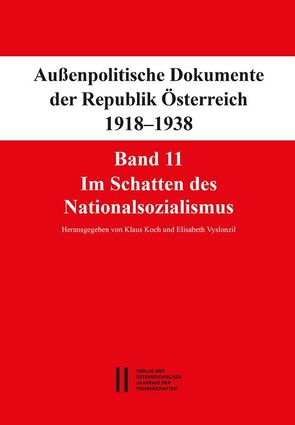
Due to the German-Austrian agreement in July 1936 and the according lift of the Thousand Mark Ban, Austria’s economic situation improved significantly. The “Axis-Agreement Berlin-Rome”, implemented in October 1936, revealed clearly that Mussolini’s approach towards Hitler ended his engagement in warranting Austria’s independence. When Schuschnigg and Undersecretary of State Guido Schmidt met Mussolini and Secretary of State Ciano in Venice in April 1937, Mussolini clearly stated, that a new system of the Danube-Basin states without Germany was beyond all question. Austria became also aware of the fact that since Schmidt’s visit in London in 1937 from the side of the western powers no guarantees on behalf of Austria’s sovereignty and independence could be expected. On the other hand Germany’s minister of warfare, Werner von Blomberg, on June 24th gave the “Instruction on consistent preparation of the Wehrmacht”, the so-called “Special case Otto” which meant the invasion of German troops into Austria in case of a restauration of the Habsburg family. Within the framework of the “Department for nation-policy of the Fatherland-Front” (Volkspolitisches Referat der Vaterländischen Front) illegal National-Socialists were integrated into government affairs since February 1937. Soon the illegal Austrian members of NSDAP increased to the number of 75.572. Also the private visit of Undersecretary Schmidt to jovial Hermann Göring on his country estate Carinhall clearly indicated the German rapprochement to Austria, and that the annexation (Anschluss) was just a question of time.
Aktualisiert: 2023-05-12
> findR *
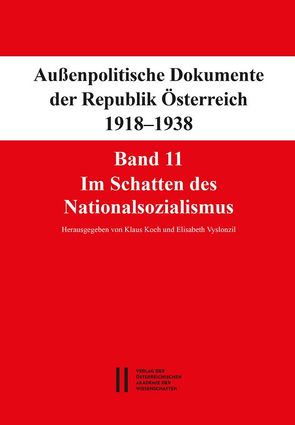
Due to the German-Austrian agreement in July 1936 and the according lift of the Thousand Mark Ban, Austria’s economic situation improved significantly. The “Axis-Agreement Berlin-Rome”, implemented in October 1936, revealed clearly that Mussolini’s approach towards Hitler ended his engagement in warranting Austria’s independence. When Schuschnigg and Undersecretary of State Guido Schmidt met Mussolini and Secretary of State Ciano in Venice in April 1937, Mussolini clearly stated, that a new system of the Danube-Basin states without Germany was beyond all question. Austria became also aware of the fact that since Schmidt’s visit in London in 1937 from the side of the western powers no guarantees on behalf of Austria’s sovereignty and independence could be expected. On the other hand Germany’s minister of warfare, Werner von Blomberg, on June 24th gave the “Instruction on consistent preparation of the Wehrmacht”, the so-called “Special case Otto” which meant the invasion of German troops into Austria in case of a restauration of the Habsburg family. Within the framework of the “Department for nation-policy of the Fatherland-Front” (Volkspolitisches Referat der Vaterländischen Front) illegal National-Socialists were integrated into government affairs since February 1937. Soon the illegal Austrian members of NSDAP increased to the number of 75.572. Also the private visit of Undersecretary Schmidt to jovial Hermann Göring on his country estate Carinhall clearly indicated the German rapprochement to Austria, and that the annexation (Anschluss) was just a question of time.
Aktualisiert: 2023-05-12
> findR *
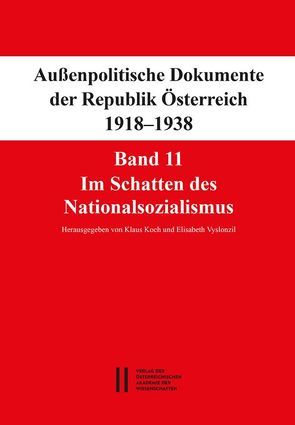
Due to the German-Austrian agreement in July 1936 and the according lift of the Thousand Mark Ban, Austria’s economic situation improved significantly. The “Axis-Agreement Berlin-Rome”, implemented in October 1936, revealed clearly that Mussolini’s approach towards Hitler ended his engagement in warranting Austria’s independence. When Schuschnigg and Undersecretary of State Guido Schmidt met Mussolini and Secretary of State Ciano in Venice in April 1937, Mussolini clearly stated, that a new system of the Danube-Basin states without Germany was beyond all question. Austria became also aware of the fact that since Schmidt’s visit in London in 1937 from the side of the western powers no guarantees on behalf of Austria’s sovereignty and independence could be expected. On the other hand Germany’s minister of warfare, Werner von Blomberg, on June 24th gave the “Instruction on consistent preparation of the Wehrmacht”, the so-called “Special case Otto” which meant the invasion of German troops into Austria in case of a restauration of the Habsburg family. Within the framework of the “Department for nation-policy of the Fatherland-Front” (Volkspolitisches Referat der Vaterländischen Front) illegal National-Socialists were integrated into government affairs since February 1937. Soon the illegal Austrian members of NSDAP increased to the number of 75.572. Also the private visit of Undersecretary Schmidt to jovial Hermann Göring on his country estate Carinhall clearly indicated the German rapprochement to Austria, and that the annexation (Anschluss) was just a question of time.
Aktualisiert: 2023-05-12
> findR *
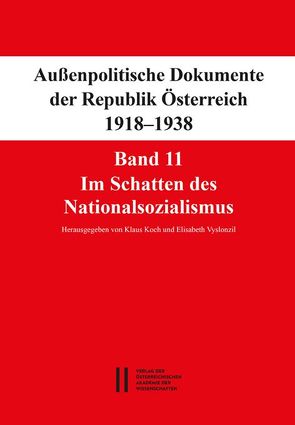
Due to the German-Austrian agreement in July 1936 and the according lift of the Thousand Mark Ban, Austria’s economic situation improved significantly. The “Axis-Agreement Berlin-Rome”, implemented in October 1936, revealed clearly that Mussolini’s approach towards Hitler ended his engagement in warranting Austria’s independence. When Schuschnigg and Undersecretary of State Guido Schmidt met Mussolini and Secretary of State Ciano in Venice in April 1937, Mussolini clearly stated, that a new system of the Danube-Basin states without Germany was beyond all question. Austria became also aware of the fact that since Schmidt’s visit in London in 1937 from the side of the western powers no guarantees on behalf of Austria’s sovereignty and independence could be expected. On the other hand Germany’s minister of warfare, Werner von Blomberg, on June 24th gave the “Instruction on consistent preparation of the Wehrmacht”, the so-called “Special case Otto” which meant the invasion of German troops into Austria in case of a restauration of the Habsburg family. Within the framework of the “Department for nation-policy of the Fatherland-Front” (Volkspolitisches Referat der Vaterländischen Front) illegal National-Socialists were integrated into government affairs since February 1937. Soon the illegal Austrian members of NSDAP increased to the number of 75.572. Also the private visit of Undersecretary Schmidt to jovial Hermann Göring on his country estate Carinhall clearly indicated the German rapprochement to Austria, and that the annexation (Anschluss) was just a question of time.
Aktualisiert: 2023-02-23
> findR *
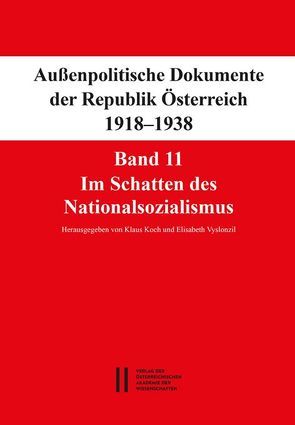
Due to the German-Austrian agreement in July 1936 and the according lift of the Thousand Mark Ban, Austria’s economic situation improved significantly. The “Axis-Agreement Berlin-Rome”, implemented in October 1936, revealed clearly that Mussolini’s approach towards Hitler ended his engagement in warranting Austria’s independence. When Schuschnigg and Undersecretary of State Guido Schmidt met Mussolini and Secretary of State Ciano in Venice in April 1937, Mussolini clearly stated, that a new system of the Danube-Basin states without Germany was beyond all question. Austria became also aware of the fact that since Schmidt’s visit in London in 1937 from the side of the western powers no guarantees on behalf of Austria’s sovereignty and independence could be expected. On the other hand Germany’s minister of warfare, Werner von Blomberg, on June 24th gave the “Instruction on consistent preparation of the Wehrmacht”, the so-called “Special case Otto” which meant the invasion of German troops into Austria in case of a restauration of the Habsburg family. Within the framework of the “Department for nation-policy of the Fatherland-Front” (Volkspolitisches Referat der Vaterländischen Front) illegal National-Socialists were integrated into government affairs since February 1937. Soon the illegal Austrian members of NSDAP increased to the number of 75.572. Also the private visit of Undersecretary Schmidt to jovial Hermann Göring on his country estate Carinhall clearly indicated the German rapprochement to Austria, and that the annexation (Anschluss) was just a question of time.
Aktualisiert: 2023-02-23
> findR *
MEHR ANZEIGEN
Bücher zum Thema Nationalzozialismus
Sie suchen ein Buch über Nationalzozialismus? Bei Buch findr finden Sie eine große Auswahl Bücher zum
Thema Nationalzozialismus. Entdecken Sie neue Bücher oder Klassiker für Sie selbst oder zum Verschenken. Buch findr
hat zahlreiche Bücher zum Thema Nationalzozialismus im Sortiment. Nehmen Sie sich Zeit zum Stöbern und finden Sie das
passende Buch für Ihr Lesevergnügen. Stöbern Sie durch unser Angebot und finden Sie aus unserer großen Auswahl das
Buch, das Ihnen zusagt. Bei Buch findr finden Sie Romane, Ratgeber, wissenschaftliche und populärwissenschaftliche
Bücher uvm. Bestellen Sie Ihr Buch zum Thema Nationalzozialismus einfach online und lassen Sie es sich bequem nach
Hause schicken. Wir wünschen Ihnen schöne und entspannte Lesemomente mit Ihrem Buch.
Nationalzozialismus - Große Auswahl Bücher bei Buch findr
Bei uns finden Sie Bücher beliebter Autoren, Neuerscheinungen, Bestseller genauso wie alte Schätze. Bücher zum
Thema Nationalzozialismus, die Ihre Fantasie anregen und Bücher, die Sie weiterbilden und Ihnen wissenschaftliche
Fakten vermitteln. Ganz nach Ihrem Geschmack ist das passende Buch für Sie dabei. Finden Sie eine große Auswahl
Bücher verschiedenster Genres, Verlage, Autoren bei Buchfindr:
Sie haben viele Möglichkeiten bei Buch findr die passenden Bücher für Ihr Lesevergnügen zu entdecken. Nutzen Sie
unsere Suchfunktionen, um zu stöbern und für Sie interessante Bücher in den unterschiedlichen Genres und Kategorien
zu finden. Unter Nationalzozialismus und weitere Themen und Kategorien finden Sie schnell und einfach eine Auflistung
thematisch passender Bücher. Probieren Sie es aus, legen Sie jetzt los! Ihrem Lesevergnügen steht nichts im Wege.
Nutzen Sie die Vorteile Ihre Bücher online zu kaufen und bekommen Sie die bestellten Bücher schnell und bequem
zugestellt. Nehmen Sie sich die Zeit, online die Bücher Ihrer Wahl anzulesen, Buchempfehlungen und Rezensionen zu
studieren, Informationen zu Autoren zu lesen. Viel Spaß beim Lesen wünscht Ihnen das Team von Buchfindr.




